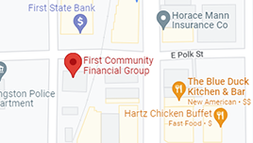First Community Financial Group, Inc. Blog |
 Every year during the holidays, people in Texas and the rest of the U.S.A. look for ways to give gifts, not just to family and friends but to those less fortunate. It’s the spirit of the season. Unfortunately, some of the charities out there don’t help people as fully as they claim – or possibly not at all. As if that weren’t enough, bogus organizations take advantage of people’s goodwill by stealing credit card and bank account information, along with identities, from people who think they’re donating to a legitimate cause. It doesn’t mean you can’t be generous this holiday season. It just means a little extra caution is in order. Here are four tips for making smart and safe holiday donations: 1. Verify the charity is legitimate. Sure, the name sounds official and you think your friend mentioned what good work they do. Or does the charity simply have a name similar to another well-known organization? Before you donate, do a little digging. Enter the charity’s name at Better Business Bureau, Charity Navigator or GuideStar, and, if you feel comfortable after reading about the organization, go ahead and donate. If not, look for another charity that supports the same cause. A good rule of thumb is to look for organizations with 501(c)(3) status. 2. Steer clear of pop-up charities. A pop-up charity is anything but charitable. These groups spring into action at opportune times, namely when people are feeling generous, such as during the holidays or following a disaster. The so-called charity is actually a scam designed to steal money, credit card numbers, bank account information and identities from unsuspecting donors. If, during your research, you come across an organization that seemingly appeared out of the blue, do not share any of your personal information with it. 3. Be careful with digital donations. Now that you’ve researched the charity, how do you plan to donate? If it’s online, be sure to type in the website address correctly. Fraudsters put up realistic-looking sites using a URL similar to a well-known charity’s to trick people into donating. But, they’re not donating at all. They’re lining the pockets of thieves. Once you know you’re on the correct site, check that it’s secure before submitting any credit card information. Simply look for “https” instead of “http” at the beginning of the URL. Likewise, that email you received from a prominent charity may be a fake. Instead of clicking on a link in an email to donate, go directly to your Web browser and type in the address yourself. 4. Avoid phone and door-to-door solicitors. If people call or knock on your door out of the blue asking for a contribution to this or that organization, ask them for the charity’s website or mailing address instead of donating right then and there. Even if it’s a charity you’ve heard of, the operation may be a scam. It’s always safer for you to initiate the donation by visiting the charity’s website or mailing in a check. Plus, fundraising over the phone requires a middleman – that agent calling you – who must be paid, reducing the amount of your donation that goes to the charity. It feels good to be in a giving mood during the holidays. With a little legwork to look into the legitimacy and practices of the charity, your donation will help others feel good too. Contact Us! At First Community Financial Group, we can work with you to make sure you've got the coverage you need, while at the same time using all possible credits and discounts to make that coverage affordable. Just give us a call at 936-327-4364 or send us a note at [email protected]. We want to help you meet your goals, and make sure what's important to you is protected! Content provided by Safeco Insurance.
0 Comments
Leave a Reply. |
Contact Us(936) 327-4364 Archives
July 2024
Categories
All
|

 RSS Feed
RSS Feed
